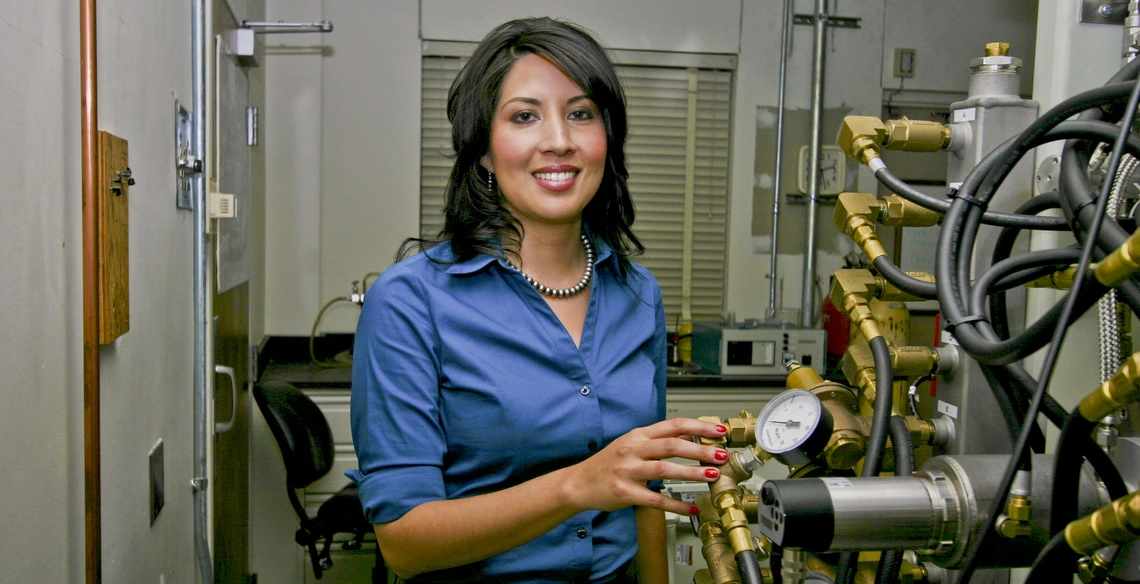UA Materials Engineer Awarded $400,000 to Research Thermal Spacecraft Shields
Assistant professor Erica L. Corral has been awarded $400,000 by the National Science Foundation to research new materials for spacecraft coatings that can withstand the super hot environments encountered in space missions.

Erica L. Corral in the Arizona Materials Lab. She is standing next to a spark plasma sintering furnace, which creates temperatures of up to 10,000 degrees Celsius in ceramic powder samples.
Assistant professor Erica Corral is the first faculty member in the UA materials science and engineering department to receive an NSF Career award. The NSF recently announced that Corral's research on oxidation behavior of ultra-high-temperature ceramic composites would get $400,000 funding over 5 years.
Under certain conditions, such as when a spacecraft re-enters the Earth's atmosphere, some parts of the vehicle can reach 2,600-2,800 degrees Celsius. That's about double the melting point of steel and more than half the estimated temperature of the Earth's core.
"There is the potential for longer missions in more extreme environments," Corral said. "However, thermal protection materials that will survive re-entry are a huge issue for space missions. Using current materials, you can only use the vehicle once because it's burned up during re-entry."
Corral is one of only three early career scientists and engineers in the U.S. to receive both an NSF Faculty Early Career Development Program Award and an Air Force Office of Scientific Research Young Investigator Program Award in 2010. The two other dual recipients were from Harvard and University of Illinois at Urbana-Champaign.
The program supports junior faculty who exemplify the role of teacher-scholars through outstanding research, excellent education, and the integration of education and research. This prestigious award also recognizes junior faculty with the highest potential to become future leaders in their research areas.
"This is a very significant award for the College of Engineering and the department of materials science and engineering because this is the first NSF Career award to a faculty member in this department since it was established in 1985," said Jeff Goldberg, dean of the College of Engineering. "Erica Corral, with her exceptional scholarly achievements, is a perfect example of our college's commitment to research."
The research supported by Corral's Career award will investigate the use of spark plasma sintering to process new ultra-high-temperature ceramic composites. Understanding these ceramics and how they oxidize will pave the way to developing new materials for use in space exploration and energy technologies.
Corral's Thermal Technology spark plasma sintering furnace uses a 3,000-amp power supply and 10 tons of force to create localized temperatures of up to 10,000 degrees Celsius between the particles of ceramic powder samples.
Specifically, Corral said her research "will focus on investigating fundamental oxidation mechanisms at the interfaces of bulk ultra-high temperature composites and layered structures for application at high temperature."
This project will also train graduate, undergraduate and high school students in specialized techniques required for ceramic processing and oxidation measurements. In addition, the project team will lead a summer research institute for undergraduate students called the Southwest Materials Research and Training, or SMaRT, program.
Corral holds a bachelor of science degree in metallurgical and materials engineering from the University of Texas at El Paso, and a doctoral degree in materials science from William Marsh Rice University. She has been with the UA since August 2008, before which she was at Sandia National Laboratories in Albuquerque, N.M.

